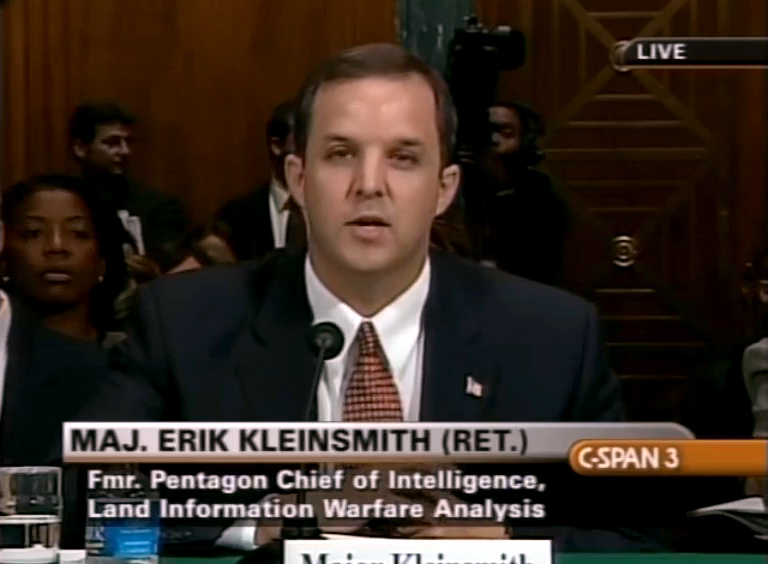
Months before the 9/11 attacks, when modern data mining was in its infancy, Erik Kleinsmith and his team of military investigators began collecting vast amounts of information that might help the United States in the global fight against terrorism.
Among the material unearthed through the top-secret program, dubbed “Able Danger,” were these three assertions from an obscure group of Michigan-based conspiracy theorists: Russia’s KGB was arming militias in Michigan, Chelsea Clinton was really the daughter of Bill Clinton confidant Webster Hubble, and a car dealership in Morocco was laundering money for Al Qaeda.
That last assertion turned out to be true: The team was able to verify it with additional intelligence on the terrorist group. But when it came time to report that information to the storied federal agency that was overseeing the investigation, the sourcing must have looked a bit odd.
“I knew as soon as the FBI saw the source of what tipped us off to this intelligence that they wouldn’t believe it,” Kleinsmith recalled.
As it turned out, getting the FBI to believe that unconventional source would be the least of Kleinsmith’s concerns. A few years later, he agreed to become a whistleblower in a congressional inquiry into what Able Danger discovered and whether that information was overlooked or ignored. In doing so, he contradicted a widely held conclusion that no one had identified lead hijacker Mohamed Atta and several of the other terrorists prior to the attacks. And he backed up the testimony of a colleague and fellow whistleblower after other members of Able Danger declined to testify.
Many would-be whistleblowers say, “‘I don’t want to go forward. I don’t want the risk,’” Kleinsmith said. But he chose to back up his colleague, nonetheless.
Patriot or Traitor?
Kleinsmith was one of six experts who discussed the role of whistleblowers—and the imperative to protect them—at a recent forum at Georgetown University’s School of Continuing Studies.
Few people go into a job expecting to become a whistleblower, and if a time comes when they have to decide whether or not to step forward, the decision can be fraught with concerns about their privacy, reputation, career, and even safety.
“Very often, it becomes a political football,” said panelist Frederic Lemieux, Ph.D., Faculty Director of Georgetown’s Master's in Applied Intelligence graduate program, who has studied the repercussions of being a whistleblower. “You are either a patriot or a treacherous person.”
A case in point is the widely varying perception of the whistleblower in the recent Ukraine investigation, which resulted in the House voting December 18 along party lines to impeach President Trump. Most Democrats seemed to view the whistleblower favorably, whereas Republicans were highly skeptical.
But while that red-hot battle raged just a few blocks away (the Georgetown event was held about two weeks before the House vote), the panelists decided to avoid the highly politicized case and instead concentrate on the compelling issues surrounding all whistleblowers, those in business as well as government, and particularly those who work in security-related fields.
Shades of Gray
Much of the discussion centered around the need to protect whistleblowers. The Intelligence Community Whistleblower Protection Act of 1998 outlines a process for intelligence community employees to report wrongdoing, but it does not shield them from retaliation.
“It’s a great first start,” said Bradley P. Moss, a Washington, D.C., attorney with expertise in national security law. “It does not, on its own, provide any protection from retaliation.”
Added John Kostyack, Executive Director of the National Whistleblower Center: “The best protection against retaliation is confidentiality.”
W. George Jameson, Co-Founder and President of the Council on Intelligence Issues and former CIA Director of the Office of Policy and Corporate Coordination, drew a distinction between whistleblowers and those who leak classified information to the media.
“I believe leakers give whistleblowers a bad name,” Jameson said. “Not every leaker is a whistleblower, and we have to keep that in mind….”
“The bottom line, when I went through the door of the CIA: Nothing was ever black and white. Everything was always gray.”